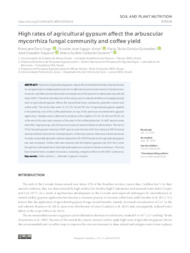High rates of agricultural gypsum affect the arbuscular mycorrhiza fungal community and coffee yield.
High rates of agricultural gypsum affect the arbuscular mycorrhiza fungal community and coffee yield.
Author(s): COGO, F. D.; SAGGIN JUNIOR, O. J.; GUIMARÃES. P. T. G.; SIQUEIRA, J. O.; CARNEIRO, M. A. C
Summary: High rates of agricultural gypsum, above the recommended levels, have been used on a regular basis to deepen plant roots and to alleviate recurrent water stress in Cerrado areas. However, very little is known about the consequences of this practice to arbuscular mycorrhizal fungi (AMF). Therefore, the objective of this study was to evaluate whether or not applying high rates of agricultural gypsum affects the mycorrhizal fungi community, glomalin content and coffee yield. The study rates were: 0; 3.5; 7.0; 14 and 56 t·ha-1 of agricultural gypsum applied in the planting row of the coffee plantation on top of the previous recommended gypsum application. Samples were collected for analysis at the depths of 0-20, 20-40 and 40-60 cm at the end of dry and rainy seasons of the year. In the coffee plantation, 16 AMF species were identified. Gigaspora sp. and Glomus macrocarpum were dominant in all situations. The rate of 7 t·ha-1 favored greater diversity of AMF species and the rate of 56 t·ha-1 reduced AMF diversity and mycorrhizal colonization in deeper layers. In the rainy season, there was a linear decrease of easily extractable glomalin-related soil protein (EE-GRSP) levels as the agricultural gypsum rate was increased. Coffee yield was reduced with the highest gypsum rate (56 t·ha-1), even though the coffee plantation had higher phosphorus contents in beans and leaves. This may have resulted from a number of reasons, including a negative effect on the AMF community.
Publication year: 2020
Types of publication: Journal article
Unit: Embrapa Agrobiology
Keywords: Cerrado, Coffea Arábica, Glomalin, Gypsum
Observation
Some of Embrapa's publications are published as ePub files. To read them, use or download one of the following free software options to your computer or mobile device. Android: Google Play Books; IOS: iBooks; Windows and Linux: Calibre.
Access other publications
Access the Agricultural Research Database (BDPA) to consult Embrapa's full library collection and records.
Visit Embrapa Bookstore to purchase books and other publications sold by Embrapa.

